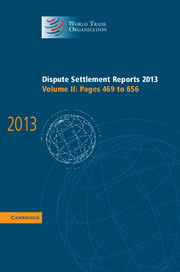Canada - Certain Measures Affecting the Renewable Energy Generation Sector / Canada - Measures Relating to the Feed-in Tariff Program (WT/DS412, WT/DS426): Reports of the Panel - Annexes
Published online by Cambridge University Press: 12 December 2017
Summary
INTRODUCTION
This dispute concerns the discriminatory treatment affecting imports of parts and equipment utilized in facilities that generate electricity from wind and solar photovoltaic (“PV”) sources (referred to hereafter as “renewable energy generation equipment”) by the Canadian Province of Ontario (“Ontario“) pursuant to its feed-in tariff (“FIT”) program (the “FIT Program”)3 established on 24 September 2009. Specifically, the FIT Program provides subsidies to generators of renewable energy in Ontario, and it requires that in order to receive those subsidies, wind and solar PV generators use renewable energy generation equipment made in Ontario (the “domestic content requirement”).
Thus, the Government of Ontario grants and maintains subsidies contingent upon the use of domestic over imported renewable energy generation equipment and accords less favorable treatment to imports of such equipment than that accorded to such equipment produced domestically. Accordingly, Japan submits that the FIT Program, as well as individually executed FIT and microFIT contracts for wind and solar PV projects, are inconsistent with Canada's obligations under: (i) Articles 3.1(b) and 3.2 of the Agreement on Subsidies and Countervailing Measures (“SCM Agreement”); (ii) Article III:4 of the General Agreement on Tariffs and Trade 1994 (“GATT 1994”); and (iii) Article 2.1 of the Agreement on Trade-Related Investment Measures (“TRIMs Agreement”).
To be clear, Japan challenges the FIT Program, and individually executed FIT and microFIT contracts, not because they have the effect of promoting investment in renewable energy generation, but rather because, in light of the domestic content requirement, they discriminate against imports of renewable energy generation equipment in favor of Ontario-made renewable energy generation equipment. Japan does not take issue with Ontario's stated goal of enhancing renewable energy generation. On the contrary, the domestic content requirement, which would have the effect of limiting generators’ access to the best available technology from the global marketplace, is inconsistent with that goal. Thus, the claims advanced by Japan cannot properly be characterized as a “trade and environment” dispute; rather, this is a “trade and investment” dispute.
- Type
- Chapter
- Information
- Dispute Settlement Reports 2013 , pp. 471 - 655Publisher: Cambridge University PressPrint publication year: 2015
- 1
- Cited by

